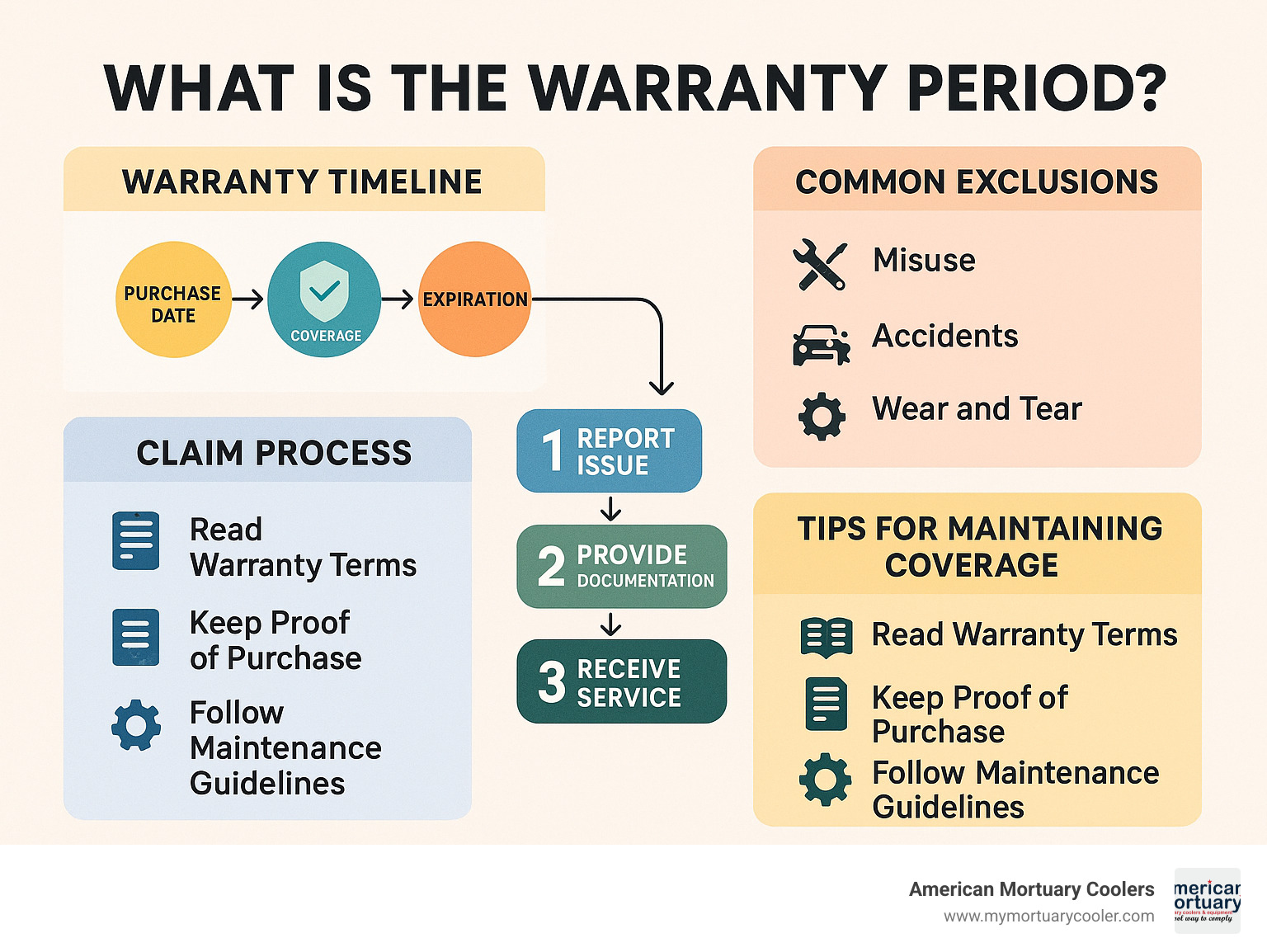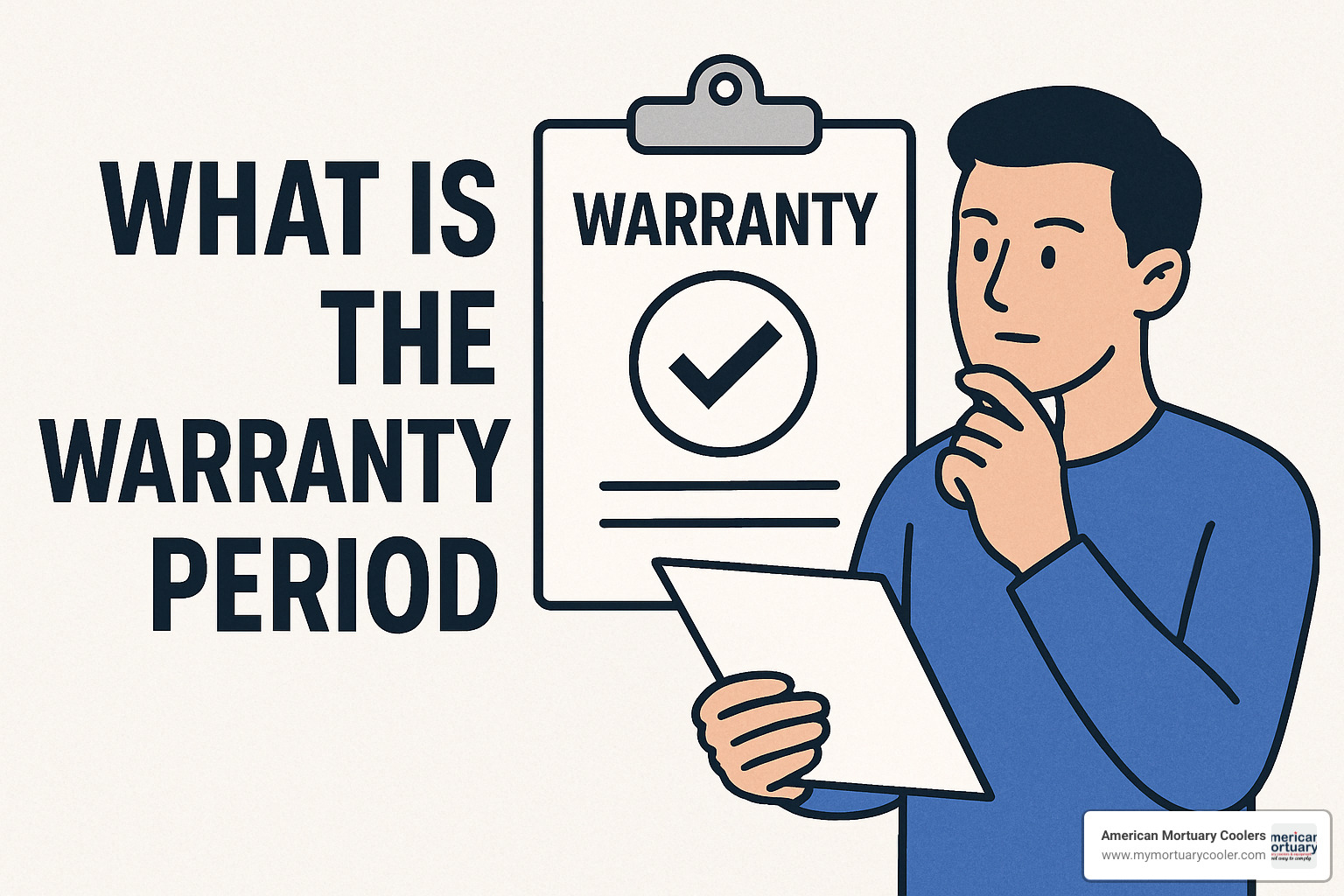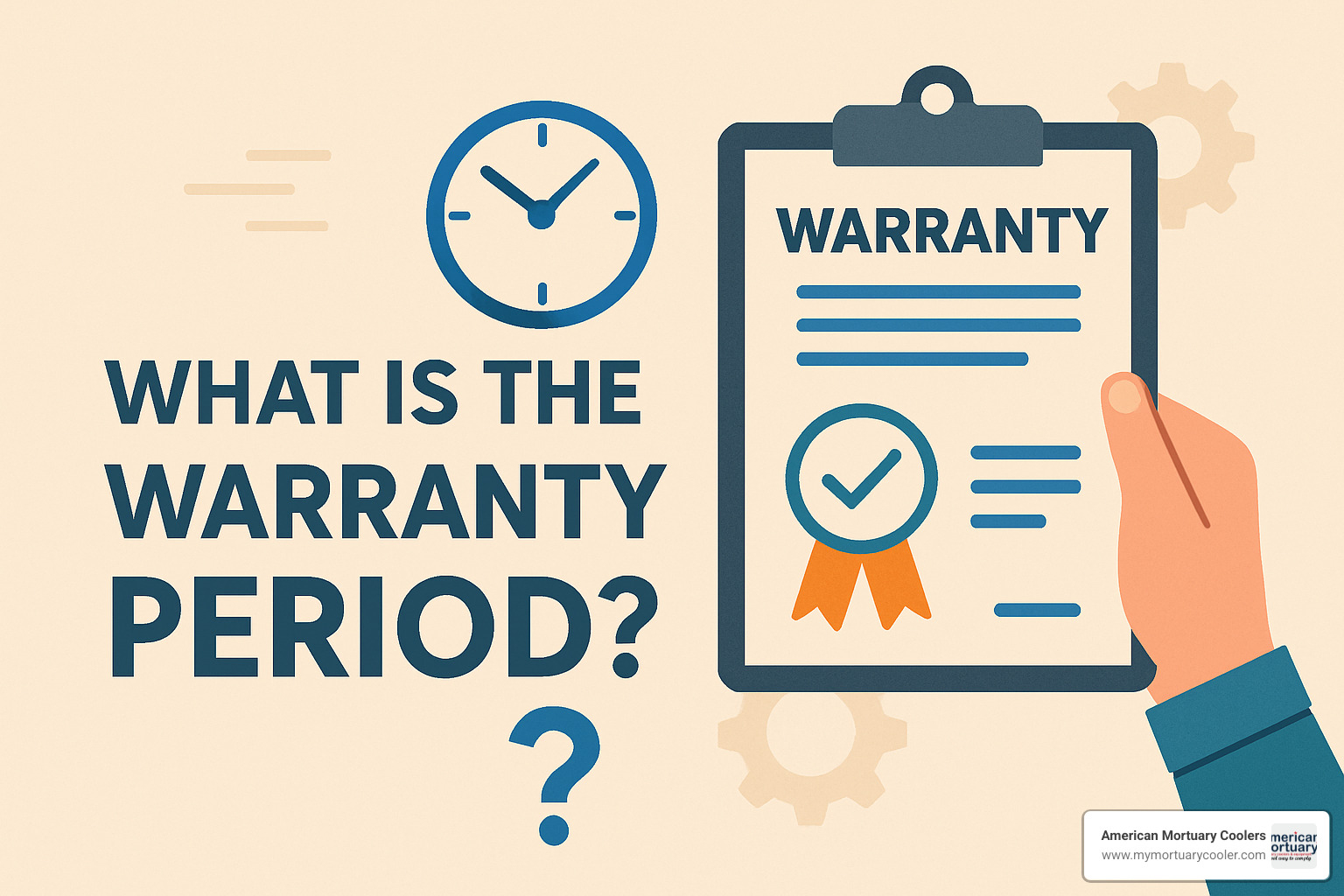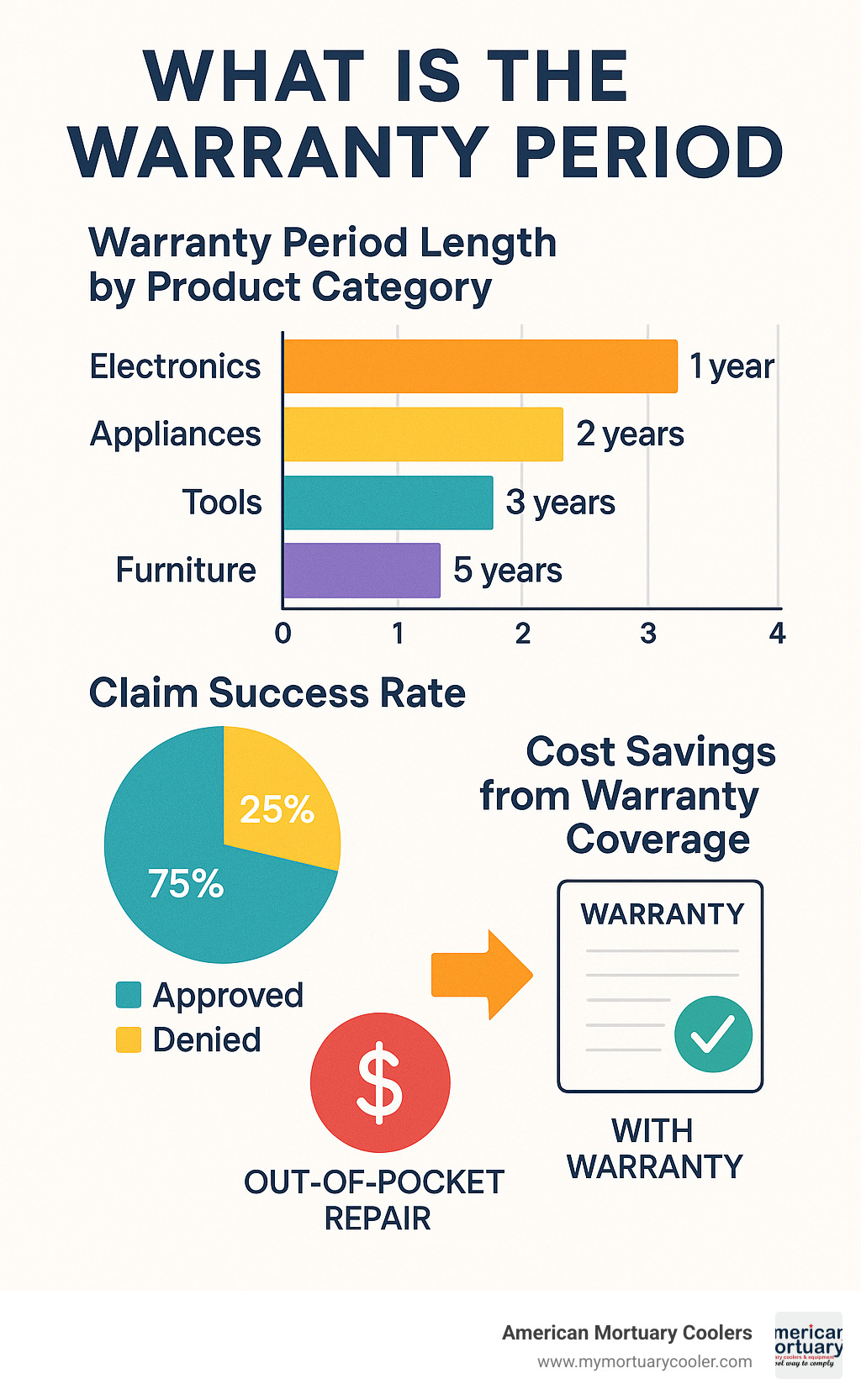Why Understanding Warranty Periods Protects Your Investment
What is the warranty period - it's the specific timeframe during which a manufacturer or seller guarantees to repair, replace, or refund a product if it fails due to defects in materials or workmanship. Here's what you need to know:
Quick Answer:
- Definition: A warranty period is the duration of coverage for manufacturing defects
- Typical Length: Ranges from 90 days to 10+ years depending on the product
- Start Date: Usually begins on purchase date or delivery date
- Coverage: Includes materials, workmanship, and sometimes labor costs
- Exclusions: Damage from misuse, accidents, or normal wear and tear
When you invest in mortuary equipment, understanding warranty periods isn't just helpful - it's essential for protecting your funeral home's operations and budget. A warranty period gives you peace of mind that if something goes wrong with your equipment due to manufacturing issues, you won't face unexpected repair costs during the covered timeframe.
Warranty periods vary dramatically by product type. Most appliances carry 12-month warranties, while specialized equipment like mortuary cooler panels can have warranties extending up to 15 years. New homes in Ontario are protected for up to 7 years, and some memory cards come with 10-year coverage.
Warranty periods aren't just about fixing broken equipment. They're also about understanding your rights as a consumer, knowing when coverage starts and ends, and recognizing what actions might void your protection entirely.
As Mortuary Cooler with years of experience helping funeral homes steer equipment warranties, I've seen too many directors lose coverage simply because they didn't understand what is the warranty period and how it works. A clear warranty strategy can save thousands in unexpected costs.

What is the warranty period terms explained:
Why Warranties Matter
Trust forms the foundation of every equipment purchase. When we invest in mortuary coolers, we're buying reliability for our most important moments. A warranty period creates that trust by guaranteeing the manufacturer stands behind their work.
Product value extends beyond the initial purchase price. Warranty coverage can significantly impact resale value and total cost of ownership. Equipment with longer warranty periods often maintains higher resale values and provides better protection against unexpected repair costs.
The Big Picture
Statutory laws protect consumers through regulations like the Magnuson-Moss Warranty Act of 1975, which mandates clear disclosure of warranty terms for products over $15 and prohibits deceptive practices. This federal law ensures that when manufacturers offer express warranties, they cannot disclaim implied warranties.
Equipment still under warranty typically commands higher prices in the secondary market. For funeral homes considering equipment upgrades, understanding remaining warranty coverage can help maximize trade-in values.
What Is the Warranty Period? Definition & Key Concepts
Let's get straight to the heart of it: what is the warranty period in simple terms? It's a legal promise from the manufacturer or seller that says "we guarantee this product will work properly for this specific amount of time." Think of it as a safety net that protects your investment.
This isn't just marketing fluff - it's a contractual commitment backed by real consumer protection laws. When American Mortuary Coolers offers a warranty on our equipment, we're legally bound to honor that promise. It's our way of saying we believe in what we build.
The time-limited nature of warranties creates clear boundaries. Unlike vague guarantees that might sound good but mean little, warranty periods have specific start and end dates. Once that clock runs out, the manufacturer's obligation for free repairs typically ends too.
Here's where it gets interesting: there are express warranties and implied warranties. Express warranties are the written guarantees you see in product documentation - the ones that spell out exactly what's covered. Implied warranties are automatic legal protections that exist whether the manufacturer mentions them or not. For example, there's an implied warranty that your mortuary cooler will actually cool things down.
For deeper insights into these concepts, check out Warranty 101: What is the Warranty Period and Why It Matters. The FTC also provides excellent scientific research on consumer warranties that covers your rights as a buyer.
Warranty Period Start & End Points
When exactly does your warranty clock start ticking? That's the trigger date, and it's not always as obvious as you might think. Most warranties begin on the purchase date shown on your receipt, but some manufacturers start the clock when the product gets delivered or when you actually take possession.
For mortuary equipment, this timing really matters. Installation and setup can take weeks after you buy the equipment. We've seen funeral directors get confused about their coverage because they assumed the warranty started when installation was complete, not when they signed the purchase order.
Your purchase receipt is your golden ticket for warranty claims. Keep that original invoice safe - along with order confirmations and delivery receipts. Digital copies work perfectly fine, but having backup copies prevents major headaches down the road.
Product registration is often optional, but it's usually worth doing. When you register your equipment with the manufacturer, you might get extended coverage, priority service, or automatic notifications about recalls. Plus, it helps manufacturers track your warranty period more accurately, which benefits you when making claims.
Warranty Period vs Product Lifespan
Here's something that surprises many funeral directors: the warranty period and expected product life are totally different things. A mortuary cooler might come with a 2-year warranty but be designed to run reliably for 15-20 years with proper care.
This gap doesn't mean the manufacturer expects their product to fail after the warranty expires. It's more about managing risk and keeping prices reasonable. Think of it like car warranties - most cars run well beyond their warranty period with proper maintenance.
Speaking of maintenance, it's the secret sauce for extending equipment life far beyond the warranty period. We've seen mortuary coolers that are still running strong after 20 years because their owners followed the maintenance schedule. On the flip side, neglecting maintenance can void your warranty and lead to early equipment failure.
| Equipment Type | Typical Warranty Period | Average Lifespan | Maintenance Impact |
|---|---|---|---|
| Mortuary Coolers | 1-2 years | 15-20 years | High |
| Refrigeration Units | 1-5 years | 10-15 years | High |
| Control Systems | 1-2 years | 8-12 years | Medium |
| Structural Panels | 7-15 years | 20+ years | Low |
The key takeaway? Your warranty period protects you during the most vulnerable time when manufacturing defects typically show up. After that, proper maintenance becomes your best friend for keeping equipment running smoothly for decades.
Types of Warranties & What They Cover
When you're shopping for mortuary equipment, you'll encounter several different types of warranties. Understanding these differences helps you know exactly what protection you're getting.
Express warranties are the written guarantees that manufacturers put in writing. These documents spell out exactly what's covered, how long coverage lasts, and what steps you need to take if problems arise. For mortuary equipment, express warranties typically cover manufacturing defects, material failures, and workmanship issues.
Implied warranties exist automatically under consumer protection laws, even when nobody mentions them. The warranty of merchantability guarantees that your mortuary cooler will actually cool things, while the warranty of fitness for a particular purpose kicks in when sellers recommend specific equipment for your funeral home's needs.
Most equipment comes with limited warranties, which restrict coverage to specific components, timeframes, or types of failures. They cover manufacturing defects while excluding damage from misuse, accidents, or normal wear and tear.
Extended warranties are service contracts that stretch coverage beyond the standard warranty period. For expensive mortuary equipment, extended warranties can provide valuable peace of mind, especially if you're running a busy funeral home where equipment downtime costs money.
Lifetime warranties promise coverage for the product's useful life. "Lifetime" means the manufacturer's definition of the product's expected life, not your lifetime. These warranties often have significant exclusions and may not transfer if you sell the equipment.
Satisfaction guarantees go beyond defect coverage - they offer refunds if you're not happy, period. Under the Magnuson-Moss Act, satisfaction guarantees must provide full refunds for any reason during the specified period.
When evaluating what is the warranty period coverage, pay attention to workmanship and parts & labor details. Workmanship coverage includes problems from poor manufacturing processes, assembly errors, or quality control failures. Parts and labor coverage determines whether you pay for replacement components, technician time, or both during warranty repairs.
The Canadian Home Builders' Association website provides excellent examples of comprehensive warranty structures.
Coverage Inclusions
Materials coverage protects against defective components that shouldn't have failed. For mortuary coolers, this includes refrigeration components, structural elements, and control systems that fail due to manufacturing defects. If the stainless steel develops premature corrosion or the insulation breaks down faster than expected, materials coverage has you covered.
Manufacturing defects encompass problems introduced during production. Poor welds, incorrect assembly, inadequate quality control, or design flaws that affect performance all fall under this umbrella.
Critical components often receive extended warranty periods beyond standard coverage. Compressors in refrigeration systems might carry 5-year warranties while other components have 1-year coverage.
Common Exclusions
Misuse represents the most common warranty exclusion. Operating equipment beyond specified parameters, using it for unintended purposes, or ignoring manufacturer guidelines can void coverage. For mortuary coolers, this means exceeding temperature ranges or overloading capacity beyond design limits.
Accidents and external damage aren't covered under standard warranties. Flood damage, power surges, physical impacts, or vandalism fall outside warranty protection. These situations require separate insurance coverage.
Unauthorized repairs void most warranties immediately and permanently. Having non-certified technicians work on equipment, using non-approved parts, or attempting DIY repairs can eliminate warranty coverage entirely.
Consumables like filters, bulbs, batteries, and other items requiring regular replacement are typically excluded from warranty coverage. These components have expected lifespans shorter than the overall warranty period.
How to Find, Extend, and Protect Your Warranty Period

Finding your warranty information doesn't have to be a treasure hunt. Documentation starts the moment you make a purchase - your order confirmation, invoice, delivery receipt, and installation records all become crucial evidence if you need to make a warranty claim later.
Create digital copies and store them in multiple places. I've seen too many funeral directors scramble to find paperwork when their mortuary cooler needs service, only to lose their warranty coverage because they couldn't prove the purchase date.
Warranty cards might seem old-fashioned, but they're worth your time. While not always required, completing and returning these cards creates an official record with the manufacturer. This helps them track your product, notify you about recalls, and verify your coverage when you need service.
Many manufacturers now offer online lookup tools that make checking your warranty status incredibly simple. Just enter your serial number or purchase information, and you'll get real-time coverage status. This is especially helpful when buying used equipment.
Product registration creates an official relationship between you and the manufacturer. Registered products often receive priority service, extended coverage periods, or automatic notifications about software updates and recalls.
Credit card extensions can effectively double your warranty coverage. Some credit cards automatically extend manufacturer warranties by 6-12 months when you make purchases with the card. This benefit often applies to mortuary equipment purchases.
International warranty rules get tricky if you have multiple locations or purchase equipment from overseas suppliers. Equipment bought in one country may not receive warranty service in another.
For more detailed strategies on protecting your warranty investment, check out An Essential Guide to Understanding the Warranty Period Meaning.
Extended Warranties & Service Contracts
Cost-benefit analysis should guide every extended warranty decision. Compare the extended warranty cost against potential repair expenses and honestly assess the likelihood of needing service. For mortuary coolers, extended warranties often make financial sense given the critical nature of the equipment.
Third-party warranty providers offer alternatives to manufacturer-backed extended warranties. These specialized companies sometimes provide more flexible terms or better coverage options. However, verify the provider's financial stability and service network before purchasing.
Extended warranty scams unfortunately target funeral home owners who understand the importance of equipment reliability. Warning signs include high-pressure sales tactics, door-to-door sales, and requests for large upfront payments.
The service scams video provides excellent guidance on recognizing and avoiding warranty-related fraud.
Keeping Your Warranty Period Valid
Routine maintenance isn't just good practice - it's essential for warranty protection. Equipment manuals and warranty documents clearly specify maintenance schedules, and following these requirements is non-negotiable for maintaining coverage.
Authorized service providers must handle all warranty work to maintain your coverage. Using unauthorized technicians, even for seemingly minor repairs, can void warranty protection entirely.
Environmental limits specified in warranty documents aren't suggestions - they're requirements. Operating mortuary coolers outside specified temperature ranges, humidity levels, or other environmental parameters can void coverage instantly.
Understanding what is the warranty period means more than knowing start and end dates - it means actively protecting that coverage through proper care and authorized service relationships.
Making a Warranty Claim & Avoiding Pitfalls

Proof of purchase serves as the foundation for all warranty claims. Original receipts, invoices, or order confirmations provide evidence of purchase date and warranty coverage. Digital records are generally acceptable, but having multiple copies prevents delays.
Claim forms vary by manufacturer but typically require basic information about the product, problem description, and purchase details. Complete forms accurately and thoroughly to avoid processing delays. Incomplete forms often result in claim rejections or requests for additional information.
Shipping arrangements for warranty repairs depend on the manufacturer's policy and product size. Small components might be shipped to repair centers, while large equipment like mortuary coolers typically require on-site service. Understand shipping responsibilities before initiating claims.
RMA (Return Merchandise Authorization) numbers are required by many manufacturers before accepting returned products. Obtain RMA numbers before shipping anything to avoid delays or rejected shipments. RMA numbers also help track claim status.
Timelines for warranty claims vary but are typically generous during the warranty period. However, some manufacturers require notification within specific timeframes after finding problems. Don't delay reporting issues even if they seem minor.
Escalation procedures help resolve disputes when initial claims are denied. Most manufacturers have internal appeal processes, and regulatory agencies like the FTC can assist with unresolved disputes. Document all communications throughout the process.
A Comprehensive Guide to Understanding Our Return Policy provides detailed guidance on navigating return and warranty processes effectively.
Warranty Period: What Can Void It?
Tampering with equipment immediately voids most warranties. Removing warranty seals, accessing internal components, or modifying equipment without authorization eliminates coverage. These actions are often irreversible, so avoid them during warranty periods.
Overclocking or operating equipment beyond specifications is a common warranty voider. Running mortuary coolers at extreme temperatures, overloading capacity, or bypassing safety systems can void coverage even if no immediate damage occurs.
Liquid damage from spills, leaks, or flooding typically voids warranties unless the equipment is specifically designed for wet environments. Protect equipment from moisture and address leaks immediately to maintain warranty coverage.
Improper installation can void warranties before equipment is even used. Following installation guidelines precisely and using qualified installers helps maintain warranty protection from day one.
Cross-Border & Second-Hand Issues
Imported goods often lose warranty coverage when moved between countries. Manufacturers typically honor warranties only in the country of purchase, leaving imported equipment without coverage. Verify warranty transferability before purchasing equipment internationally.
Non-transferability affects warranty coverage when equipment changes ownership. Many warranties are limited to original purchasers and don't transfer to subsequent owners. This limitation affects resale values and should be considered when purchasing used equipment.
Local laws may provide additional protection beyond manufacturer warranties. Some jurisdictions require minimum warranty periods or mandate specific coverage types. Understanding local consumer protection laws helps maximize warranty benefits.

Frequently Asked Questions about the Warranty Period
How do I know if my product is still within the warranty period?
Your warranty period detective work starts with the paperwork trail. Dig out that purchase receipt or invoice - it's your golden ticket to warranty coverage. Most warranties kick off on the purchase date and run for whatever time the manufacturer promised.
Lost your paperwork? Don't panic. Grab your product's serial number and give the manufacturer a call. Most companies keep detailed databases that can tell you exactly where you stand with warranty coverage. It's like having a warranty crystal ball.
Product registration records are another lifesaver if you took the time to fill them out. Many manufacturers offer slick online tools where you can punch in your serial number and get instant warranty status updates. It's pretty handy when you're wondering what is the warranty period status for your equipment.
For funeral directors managing multiple pieces of mortuary equipment, I always recommend creating a simple tracking system. List your purchase dates, warranty lengths, and expiration dates for everything. Trust me, future you will thank present you when something needs service and you're not scrambling through file cabinets at 2 AM.
What happens if my item fails just after the warranty period expires?
Here's a little secret from the industry: call the manufacturer anyway. Seriously. Many companies will offer goodwill repairs for equipment that fails right after the warranty expires, especially if you've been a loyal customer or the failure screams "manufacturing defect."
The worst thing they can say is no, but you'd be surprised how often they say yes. Companies know that a small repair cost today can mean a customer for life tomorrow.
Credit card benefits might save the day too. Some credit cards automatically extend manufacturer warranties by six to twelve months when you use the card for purchases. Check your credit card perks - you might have coverage you forgot about.
When facing a post-warranty failure, crunch the numbers. Sometimes that first failure after the warranty period ends is a warning sign that other components are getting ready to call it quits. In those cases, replacement might make more financial sense than throwing good money after bad on repairs.
Can the warranty period be transferred to a new owner?
Most warranties are like concert tickets - they're tied to the original buyer and can't be passed along. The warranty period typically stays with whoever made the original purchase, not the equipment itself.
But here's where it gets interesting: some manufacturers do offer transferable warranties or let you transfer coverage for a fee. Your warranty paperwork will spell out the transfer rules, so give it a read before assuming anything.
Transferable warranties can be gold for resale value. When funeral homes are shopping for used mortuary equipment, knowing the warranty transfers with the purchase can justify paying more. It's like buying peace of mind along with the equipment.
Some warranties play by hybrid rules - they'll transfer to new owners but with shorter coverage periods or different terms. Always verify warranty status when buying used equipment. That "great deal" might not look so great if the warranty died with the previous owner.
For mortuary equipment specifically, warranty transferability can make or break a resale deal. Buyers know that what is the warranty period remaining can significantly impact their total cost of ownership, so transferable coverage often tips the scales in favor of a purchase.
Conclusion
What is the warranty period - by now you know it's far more than just a date on your calendar. It's your safety net, your peace of mind, and honestly, your best friend when expensive mortuary equipment decides to act up at the worst possible moment.
We've covered everything from 90-day coverage on basic components to those impressive 15-year warranties on specialized panels. The truth is, warranty periods are like insurance policies - you hope you'll never need them, but you're incredibly grateful when you do.
At American Mortuary Coolers, we've seen funeral directors face equipment failures at 2 AM during their busiest weeks. That's exactly why we back our mortuary equipment with clear, comprehensive warranties that actually mean something. When we say we'll stand behind our coolers, we mean it - across all 48 contiguous states, no matter what.
Here's what really matters: warranty periods aren't created equal. While your smartphone might come with a 12-month warranty, our cooler panels can carry up to 15 years of protection. That's because we understand the critical role this equipment plays in your funeral home's daily operations.
But warranties are just part of the story. Durability and reliability matter just as much as warranty coverage. The best warranty in the world won't help if your equipment breaks down every few months. That's why we focus on building coolers that rarely need warranty service in the first place.
Remember what we discussed about protecting your warranty coverage? Following maintenance schedules, using authorized service providers, and operating within specifications - these aren't just suggestions. They're your guarantee that when something does go wrong, you'll have full warranty protection backing you up.
Whether you're buying your first mortuary cooler or expanding your facility, understanding what is the warranty period helps you make smarter decisions. Don't let warranty confusion cost you thousands in unexpected repair bills or leave you scrambling for service when families are counting on you.
The bottom line: Good warranty coverage combined with quality equipment gives you the confidence to focus on what matters most - serving families during their most difficult times.
Learn more and request a custom cooler to find how American Mortuary Coolers combines superior craftsmanship with industry-leading warranty protection designed specifically for funeral homes like yours.




















